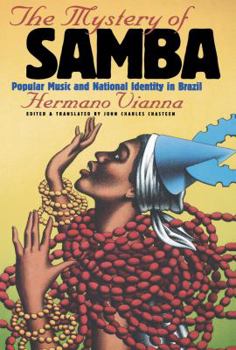The Mystery of Samba: Popular Music and National Identity in Brazil
(Part of the Latin America in Translation Series)
Select Format
Select Condition 
Book Overview
Samba is Brazil's "national rhythm," the foremost symbol of its culture and nationhood. To the outsider, samba and the famous pre-Lenten carnival of which it is the centerpiece seem to showcase the country's African heritage. Within Brazil, however, samba symbolizes the racial and cultural mixture that, since the 1930s, most Brazilians have come to believe defines their unique national identity.
But how did Brazil become "the Kingdom of Samba"...
Format:Paperback
Language:English
ISBN:0807847666
ISBN13:9780807847664
Release Date:February 1999
Publisher:University of North Carolina Press
Length:168 Pages
Weight:0.58 lbs.
Dimensions:0.4" x 5.5" x 9.3"
Customer Reviews
2 ratings
Interesting, but requires some Brazilian "cultural literacy"
Published by Thriftbooks.com User , 14 years ago
Halfway through this book, I'd have agreed with the reviewer who complains that the dancer on the cover is misleading. But by the time I finished it, I could see an angle from which the cover was appropriate. Why do we take it for granted that samba and dancers like the one shown symbolize Brazil? -- this is the "mystery" of the title. Vianna describes how until the 1930s, samba was just a minor regional music from Rio, in a country with zillions of regional musics. "Brazilian music" of the day wasn't even folk music, but followed European trends. (If you don't believe me, check out Brazil's national anthem on Wikipedia -- it sounds like it's from an Italian opera by Rossini.) In Vianna's telling, during the 1930s and '40s samba was transformed into a national symbol as part of a conscious decision to build a "national myth," in an effort spearheaded by intellectuals like Gilberto Freyre. Another of Vianna's major arguments is that Brazilian national identity crystallized around the idea of racial mixture, with racial "purity" being regarded as a kind of defect. He provides some occasional interesting tidbits, too, such as that Carmen Miranda was a Portuguese national who never held a Brazilian passport. As for the book's being a re-purposed Ph.D. thesis, it's much better-written than most others in that genre that I've read. The academic jargon is mostly in the first and last chapters. That said, though, you could find the book frustrating if you don't have a certain amount of "cultural literacy" about Brazil, beyond knowledge of recent popular music. The names of authors and other historical figures come fast and furious, with little or no explanation. If you don't know a little about, e.g., Noel Rosa, Pixinguinha, Heitor Villa-Lobos, and especially Getúlio Vargas, and at least recognize the names of folks like Machado de Assis and Euclides Da Cunha, you might want first to read a book or two about Brazilian cultural and political history before trying this one. Having heard of Frenchmen Blaise Cendrars or Darius Milhaud might also help. From my experience, even after reading several such books and listening to some older styles of music a lot of the name-dropping may go over your head anyway; but you may be less tempted to throw the book at the wall. At a substantive level, I wished that Vianna had focused a little less on the influence of sociologist Freyre and rather more on the activities of the Vargas regime in elevating samba. The occasional factual error that I could recognize (such as that "Italian operettas by Bellini and Donizetti" were "playing to full houses in Lisbon" in 1808 (@18-19), i.e. when the composers were aged 7 and 10 respectively) made me worry that there were some others that I couldn't. The translation is generally smooth, though an allusion to a pun in some lyrics of rock group Titãs (@100) assumes you know the original Portuguese the joke is based on (I didn't). In summary, you'll be more satisfied if you think of
provocative & interesting read
Published by Thriftbooks.com User , 20 years ago
This is a straightforward, easy to read, enjoyable and informative book about how samba dance and music moved from a marginalized position to one now considered to be at the "heart" of Brazilian identity. Vianna, a scholar of music, introduces the reader to important samba musicians, intellectuals, and government officials in this story that centers around the rule of Getulio Vargas which began in the 1930s and lasted into the 1950s. Vianna connects samba to ideas of national identity and race, offering insight into why, despite the celebration of samba and Afro-Brazilian roots, Brazilians of African descent continue to face discrimination. This book would make a great read for non-scholars and students alike, who are interested in music, Brazil, and the African diaspora.






